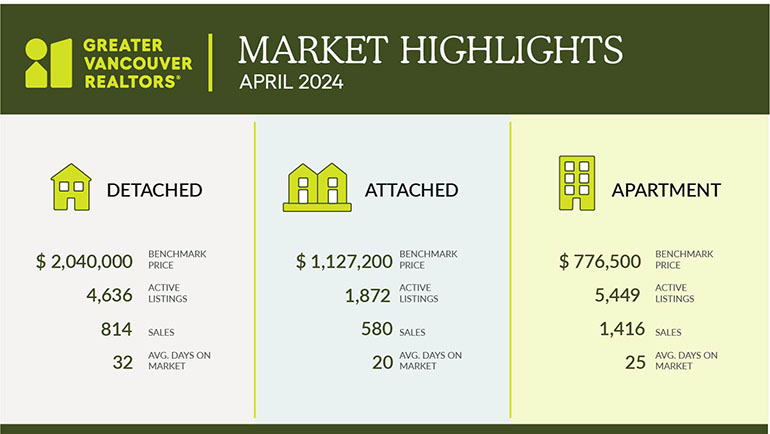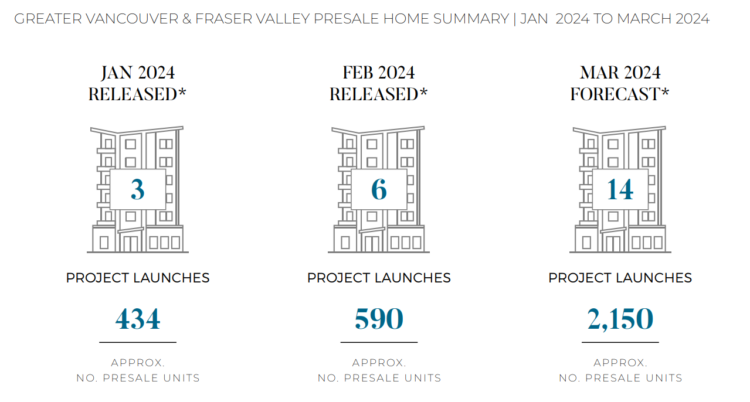METRO VANCOUVER HOUSING MARKET HIGHLIGHTS | APRIL 2024

MARKET UPDATE: Inventory Reaches Highest Level Since the Pandemic Summer of 2020
Source: GVR

Actively listed homes for sale on the MLS® in Metro Vancouver1 continued climbing in April, up 42 per cent year-over-year, breaching the 12,000 mark, a number not seen in the region since the summer of 2020.
Greater Vancouver REALTORS® (GVR)2 reports that residential sales3 in the region totalled 2,831 in April 2024, a 3.3 per cent increase from the 2,741 sales recorded in April 2023. This was 12.2 per cent below the 10-year seasonal average (3,223).
“It’s a feat to see inventory finally climb above 12,000. Many were predicting higher inventory levels would materialize quickly when the Bank of Canada began its aggressive rate hikes, but we’re only seeing a steady climb in inventory in the more recent data. The surprise for many market watchers has been the continued strength of demand along with the fact few homeowners have been forced to sell in the face of the highest borrowing costs experienced in over a decade.”
Andrew Lis, REBGV director of economics and data analytics
There were 7,092 detached, attached and apartment properties newly listed for sale on the Multiple Listing Service® (MLS®) in Metro Vancouver in April 2024. This represents a 64.7 per cent increase compared to the 4,307 properties listed in April 2023.
This was 25.8 per cent above the 10-year seasonal average (5,637).
The total number of properties currently listed for sale on the MLS® system in Metro Vancouver is 12,491, a 42.1 per cent increase compared to April 2023 (8,790).
This is 16.7 per cent above the 10-year seasonal average (10,704).
Across all detached, attached and apartment property types, the sales-to-active listings ratio for April 2024 is 23.5 per cent. By property type, the ratio is 17.6 per cent for detached homes, 31.0 per cent for attached, and 26.0 per cent for apartments.
Analysis of the historical data suggests downward pressure on home prices occurs when the ratio dips below 12 per cent for a sustained period, while home prices often experience upward pressure when it surpasses 20 per cent over several months.

“Another surprising story in the April data is the fact prices continue climbing across most segments with recent increases typically in the range of one to two per cent month-over-month,” Lis said.
“The one segment that didn’t see an uptick in prices in April were apartments, which saw a 0.1 per cent decline month-over-month. This moderation is likely due to a confluence of factors impacting this more affordability sensitive segment of the market, particularly the impact of higher mortgage rates and the recent boost to inventory levels, tempering competition somewhat.”
The MLS® Home Price Index composite benchmark price for all residential properties in Metro Vancouver is currently $1,205,800. This represents a 2.8 per cent increase over April 2023 and a 0.8 per cent increase compared to March 2024.
Sales of detached homes in April 2024 reached 814, a 0.7 per cent increase from the 808 detached sales recorded in April 2023. The benchmark price for a detached home is $2,040,000. This represents a 6.3 per cent increase from April 2023 and a 1.6 per cent increase compared to March 2024.
Sales of apartment homes reached 1,416 in April 2024, a 0.2 per cent increase compared to the 1,413 sales in April 2023. The benchmark price of an apartment home is $776,500. This represents a 3.2 per cent increase from April 2023 and a 0.1 per cent decrease compared to March 2024.
Attached home sales in April 2024 totalled 580, a 16 per cent increase compared to the 500 sales in April 2023. The benchmark price of a townhouse3 is $1,127,200. This represents a 4.3 per cent increase from April 2023 and a 1.3 per cent increase compared to March 2024.
1 Areas covered by the Greater Vancouver REALTORS® include: Bowen Island, Burnaby, Coquitlam, Maple Ridge, New Westminster, North Vancouver, Pitt Meadows, Port Coquitlam, Port Moody, Richmond, South Delta, Squamish, Sunshine Coast, Vancouver, West Vancouver, and Whistler.
2 On February 12, 2024, The Real Estate Board of Greater Vancouver changed its organizational name to the Greater Vancouver REALTORS®.
3 In calculating the MLS® HPI, Altus Group uses a narrower definition of “attached” properties than is used by GVR in our “attached” statistics, preferring to use “townhouse” as their benchmark property.
CLICK HERE – Full GVR April 2024 Housing Market Update
Vancouver BC – May 2, 2024
Have a look at the GVR April 2024 Market Update Insights!
- DOWNLOAD the GVR April 2024 Housing Market Update CLICK HERE
- See the Monthly Market Stats CLICK HERE
- For more market information from the Greater Vancouver REALTORS® CLICK HERE
- To view Geoff Jarman’s Listings CLICK HERE



